Entrepreneurship & Small Business Management: Venture Types Report
VerifiedAdded on 2020/11/23
|18
|5268
|122
Report
AI Summary
This report provides a comprehensive analysis of entrepreneurship and small business management, covering various types of entrepreneurial ventures, including small businesses, scalable start-ups, large company entrepreneurship, and social entrepreneurship. It examines the similarities and differences between private and public sector ventures, highlighting the unique characteristics of micro, small, and medium-sized enterprises. The report also assesses the economic impacts of micro and small businesses, emphasizing their role in job creation, innovation, and women's empowerment. Furthermore, it identifies the key characteristics and skills of successful entrepreneurs and explores how a person's background and experience can foster entrepreneurship. The document concludes by underscoring the importance of small businesses and start-ups in the growth of the social economy.

Entrepreneurship and Small
Business Management
Business Management
Paraphrase This Document
Need a fresh take? Get an instant paraphrase of this document with our AI Paraphraser
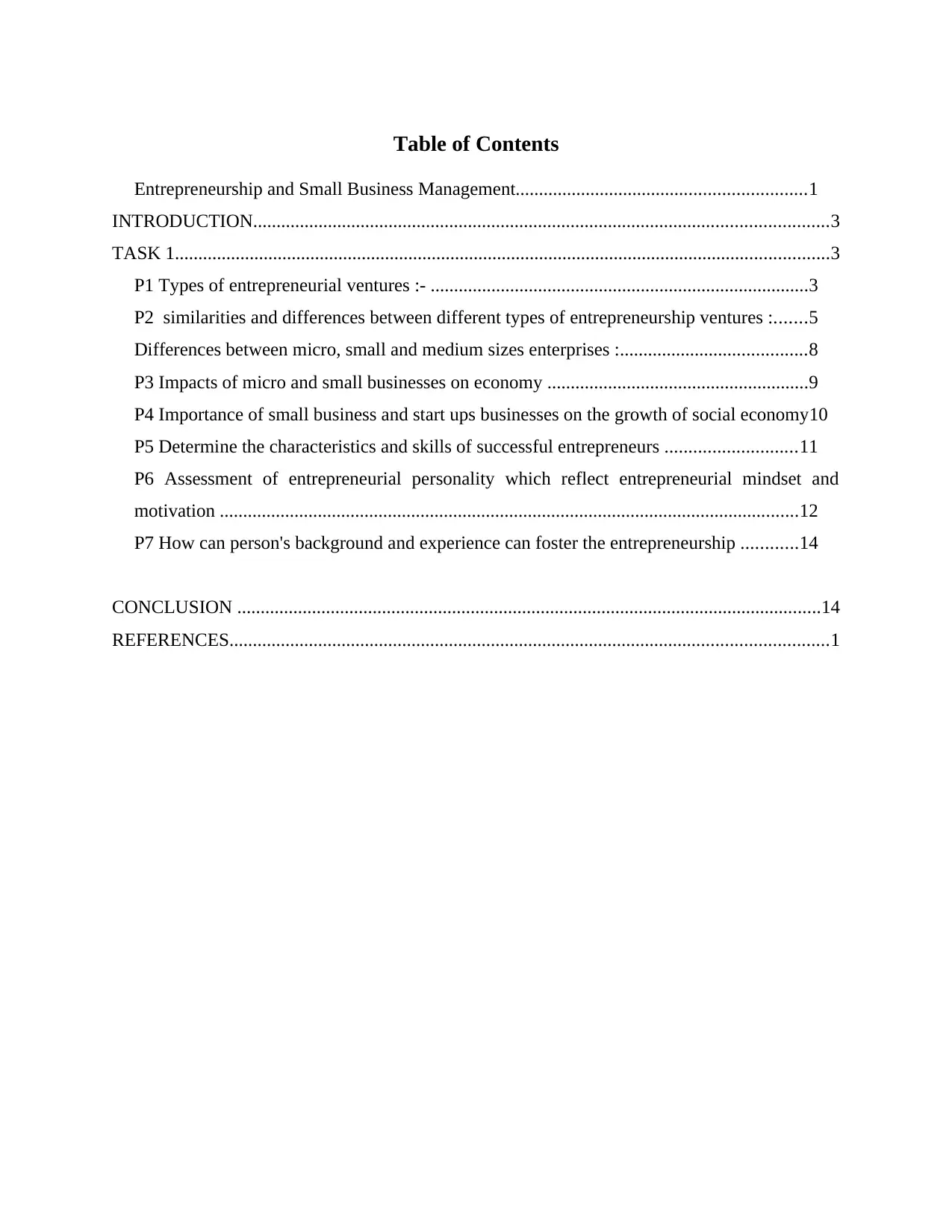
Table of Contents
Entrepreneurship and Small Business Management..............................................................1
INTRODUCTION...........................................................................................................................3
TASK 1............................................................................................................................................3
P1 Types of entrepreneurial ventures :- .................................................................................3
P2 similarities and differences between different types of entrepreneurship ventures :.......5
Differences between micro, small and medium sizes enterprises :........................................8
P3 Impacts of micro and small businesses on economy ........................................................9
P4 Importance of small business and start ups businesses on the growth of social economy10
P5 Determine the characteristics and skills of successful entrepreneurs ............................11
P6 Assessment of entrepreneurial personality which reflect entrepreneurial mindset and
motivation ............................................................................................................................12
P7 How can person's background and experience can foster the entrepreneurship ............14
CONCLUSION .............................................................................................................................14
REFERENCES................................................................................................................................1
Entrepreneurship and Small Business Management..............................................................1
INTRODUCTION...........................................................................................................................3
TASK 1............................................................................................................................................3
P1 Types of entrepreneurial ventures :- .................................................................................3
P2 similarities and differences between different types of entrepreneurship ventures :.......5
Differences between micro, small and medium sizes enterprises :........................................8
P3 Impacts of micro and small businesses on economy ........................................................9
P4 Importance of small business and start ups businesses on the growth of social economy10
P5 Determine the characteristics and skills of successful entrepreneurs ............................11
P6 Assessment of entrepreneurial personality which reflect entrepreneurial mindset and
motivation ............................................................................................................................12
P7 How can person's background and experience can foster the entrepreneurship ............14
CONCLUSION .............................................................................................................................14
REFERENCES................................................................................................................................1
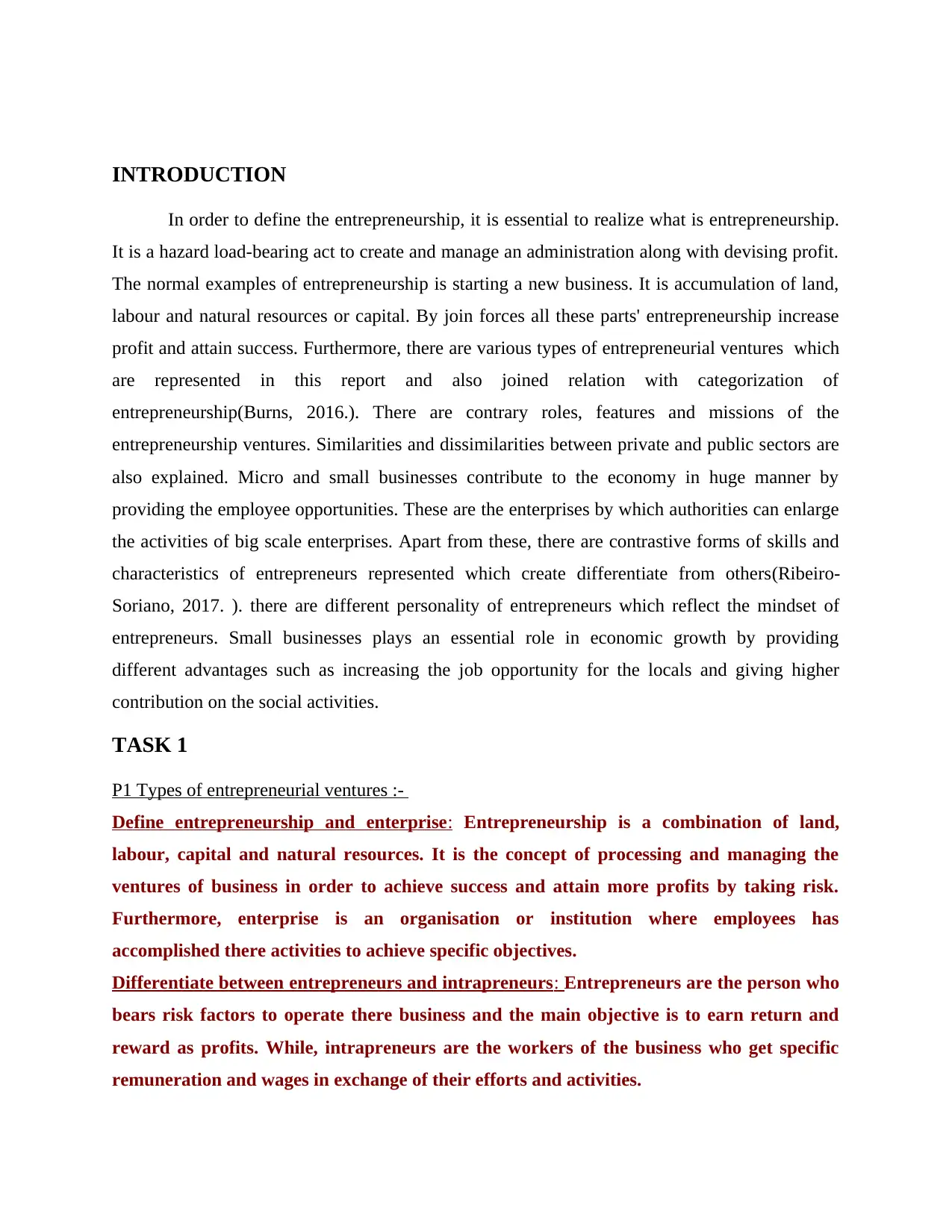
INTRODUCTION
In order to define the entrepreneurship, it is essential to realize what is entrepreneurship.
It is a hazard load-bearing act to create and manage an administration along with devising profit.
The normal examples of entrepreneurship is starting a new business. It is accumulation of land,
labour and natural resources or capital. By join forces all these parts' entrepreneurship increase
profit and attain success. Furthermore, there are various types of entrepreneurial ventures which
are represented in this report and also joined relation with categorization of
entrepreneurship(Burns, 2016.). There are contrary roles, features and missions of the
entrepreneurship ventures. Similarities and dissimilarities between private and public sectors are
also explained. Micro and small businesses contribute to the economy in huge manner by
providing the employee opportunities. These are the enterprises by which authorities can enlarge
the activities of big scale enterprises. Apart from these, there are contrastive forms of skills and
characteristics of entrepreneurs represented which create differentiate from others(Ribeiro-
Soriano, 2017. ). there are different personality of entrepreneurs which reflect the mindset of
entrepreneurs. Small businesses plays an essential role in economic growth by providing
different advantages such as increasing the job opportunity for the locals and giving higher
contribution on the social activities.
TASK 1
P1 Types of entrepreneurial ventures :-
Define entrepreneurship and enterprise: Entrepreneurship is a combination of land,
labour, capital and natural resources. It is the concept of processing and managing the
ventures of business in order to achieve success and attain more profits by taking risk.
Furthermore, enterprise is an organisation or institution where employees has
accomplished there activities to achieve specific objectives.
Differentiate between entrepreneurs and intrapreneurs: Entrepreneurs are the person who
bears risk factors to operate there business and the main objective is to earn return and
reward as profits. While, intrapreneurs are the workers of the business who get specific
remuneration and wages in exchange of their efforts and activities.
In order to define the entrepreneurship, it is essential to realize what is entrepreneurship.
It is a hazard load-bearing act to create and manage an administration along with devising profit.
The normal examples of entrepreneurship is starting a new business. It is accumulation of land,
labour and natural resources or capital. By join forces all these parts' entrepreneurship increase
profit and attain success. Furthermore, there are various types of entrepreneurial ventures which
are represented in this report and also joined relation with categorization of
entrepreneurship(Burns, 2016.). There are contrary roles, features and missions of the
entrepreneurship ventures. Similarities and dissimilarities between private and public sectors are
also explained. Micro and small businesses contribute to the economy in huge manner by
providing the employee opportunities. These are the enterprises by which authorities can enlarge
the activities of big scale enterprises. Apart from these, there are contrastive forms of skills and
characteristics of entrepreneurs represented which create differentiate from others(Ribeiro-
Soriano, 2017. ). there are different personality of entrepreneurs which reflect the mindset of
entrepreneurs. Small businesses plays an essential role in economic growth by providing
different advantages such as increasing the job opportunity for the locals and giving higher
contribution on the social activities.
TASK 1
P1 Types of entrepreneurial ventures :-
Define entrepreneurship and enterprise: Entrepreneurship is a combination of land,
labour, capital and natural resources. It is the concept of processing and managing the
ventures of business in order to achieve success and attain more profits by taking risk.
Furthermore, enterprise is an organisation or institution where employees has
accomplished there activities to achieve specific objectives.
Differentiate between entrepreneurs and intrapreneurs: Entrepreneurs are the person who
bears risk factors to operate there business and the main objective is to earn return and
reward as profits. While, intrapreneurs are the workers of the business who get specific
remuneration and wages in exchange of their efforts and activities.
⊘ This is a preview!⊘
Do you want full access?
Subscribe today to unlock all pages.

Trusted by 1+ million students worldwide
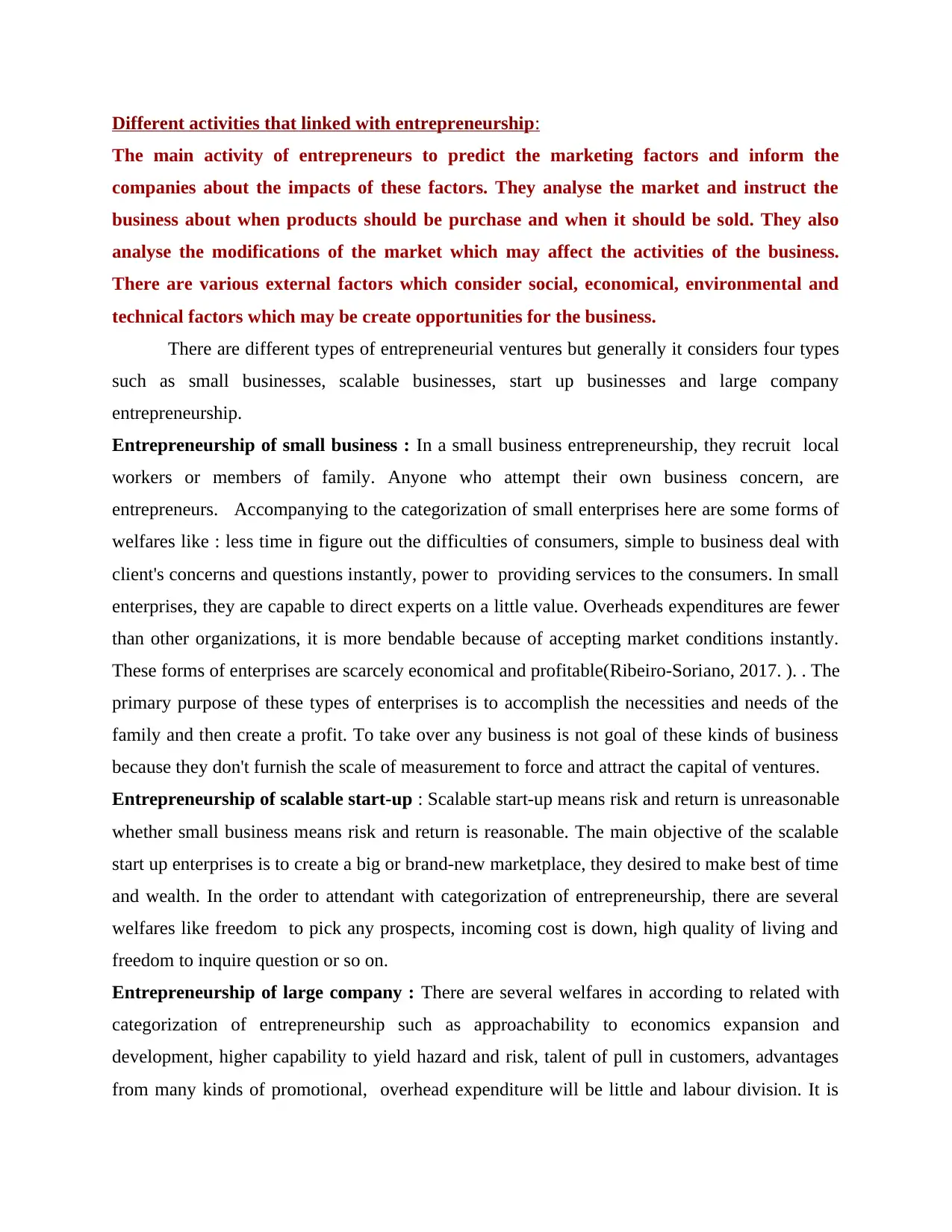
Different activities that linked with entrepreneurship:
The main activity of entrepreneurs to predict the marketing factors and inform the
companies about the impacts of these factors. They analyse the market and instruct the
business about when products should be purchase and when it should be sold. They also
analyse the modifications of the market which may affect the activities of the business.
There are various external factors which consider social, economical, environmental and
technical factors which may be create opportunities for the business.
There are different types of entrepreneurial ventures but generally it considers four types
such as small businesses, scalable businesses, start up businesses and large company
entrepreneurship.
Entrepreneurship of small business : In a small business entrepreneurship, they recruit local
workers or members of family. Anyone who attempt their own business concern, are
entrepreneurs. Accompanying to the categorization of small enterprises here are some forms of
welfares like : less time in figure out the difficulties of consumers, simple to business deal with
client's concerns and questions instantly, power to providing services to the consumers. In small
enterprises, they are capable to direct experts on a little value. Overheads expenditures are fewer
than other organizations, it is more bendable because of accepting market conditions instantly.
These forms of enterprises are scarcely economical and profitable(Ribeiro-Soriano, 2017. ). . The
primary purpose of these types of enterprises is to accomplish the necessities and needs of the
family and then create a profit. To take over any business is not goal of these kinds of business
because they don't furnish the scale of measurement to force and attract the capital of ventures.
Entrepreneurship of scalable start-up : Scalable start-up means risk and return is unreasonable
whether small business means risk and return is reasonable. The main objective of the scalable
start up enterprises is to create a big or brand-new marketplace, they desired to make best of time
and wealth. In the order to attendant with categorization of entrepreneurship, there are several
welfares like freedom to pick any prospects, incoming cost is down, high quality of living and
freedom to inquire question or so on.
Entrepreneurship of large company : There are several welfares in according to related with
categorization of entrepreneurship such as approachability to economics expansion and
development, higher capability to yield hazard and risk, talent of pull in customers, advantages
from many kinds of promotional, overhead expenditure will be little and labour division. It is
The main activity of entrepreneurs to predict the marketing factors and inform the
companies about the impacts of these factors. They analyse the market and instruct the
business about when products should be purchase and when it should be sold. They also
analyse the modifications of the market which may affect the activities of the business.
There are various external factors which consider social, economical, environmental and
technical factors which may be create opportunities for the business.
There are different types of entrepreneurial ventures but generally it considers four types
such as small businesses, scalable businesses, start up businesses and large company
entrepreneurship.
Entrepreneurship of small business : In a small business entrepreneurship, they recruit local
workers or members of family. Anyone who attempt their own business concern, are
entrepreneurs. Accompanying to the categorization of small enterprises here are some forms of
welfares like : less time in figure out the difficulties of consumers, simple to business deal with
client's concerns and questions instantly, power to providing services to the consumers. In small
enterprises, they are capable to direct experts on a little value. Overheads expenditures are fewer
than other organizations, it is more bendable because of accepting market conditions instantly.
These forms of enterprises are scarcely economical and profitable(Ribeiro-Soriano, 2017. ). . The
primary purpose of these types of enterprises is to accomplish the necessities and needs of the
family and then create a profit. To take over any business is not goal of these kinds of business
because they don't furnish the scale of measurement to force and attract the capital of ventures.
Entrepreneurship of scalable start-up : Scalable start-up means risk and return is unreasonable
whether small business means risk and return is reasonable. The main objective of the scalable
start up enterprises is to create a big or brand-new marketplace, they desired to make best of time
and wealth. In the order to attendant with categorization of entrepreneurship, there are several
welfares like freedom to pick any prospects, incoming cost is down, high quality of living and
freedom to inquire question or so on.
Entrepreneurship of large company : There are several welfares in according to related with
categorization of entrepreneurship such as approachability to economics expansion and
development, higher capability to yield hazard and risk, talent of pull in customers, advantages
from many kinds of promotional, overhead expenditure will be little and labour division. It is
Paraphrase This Document
Need a fresh take? Get an instant paraphrase of this document with our AI Paraphraser
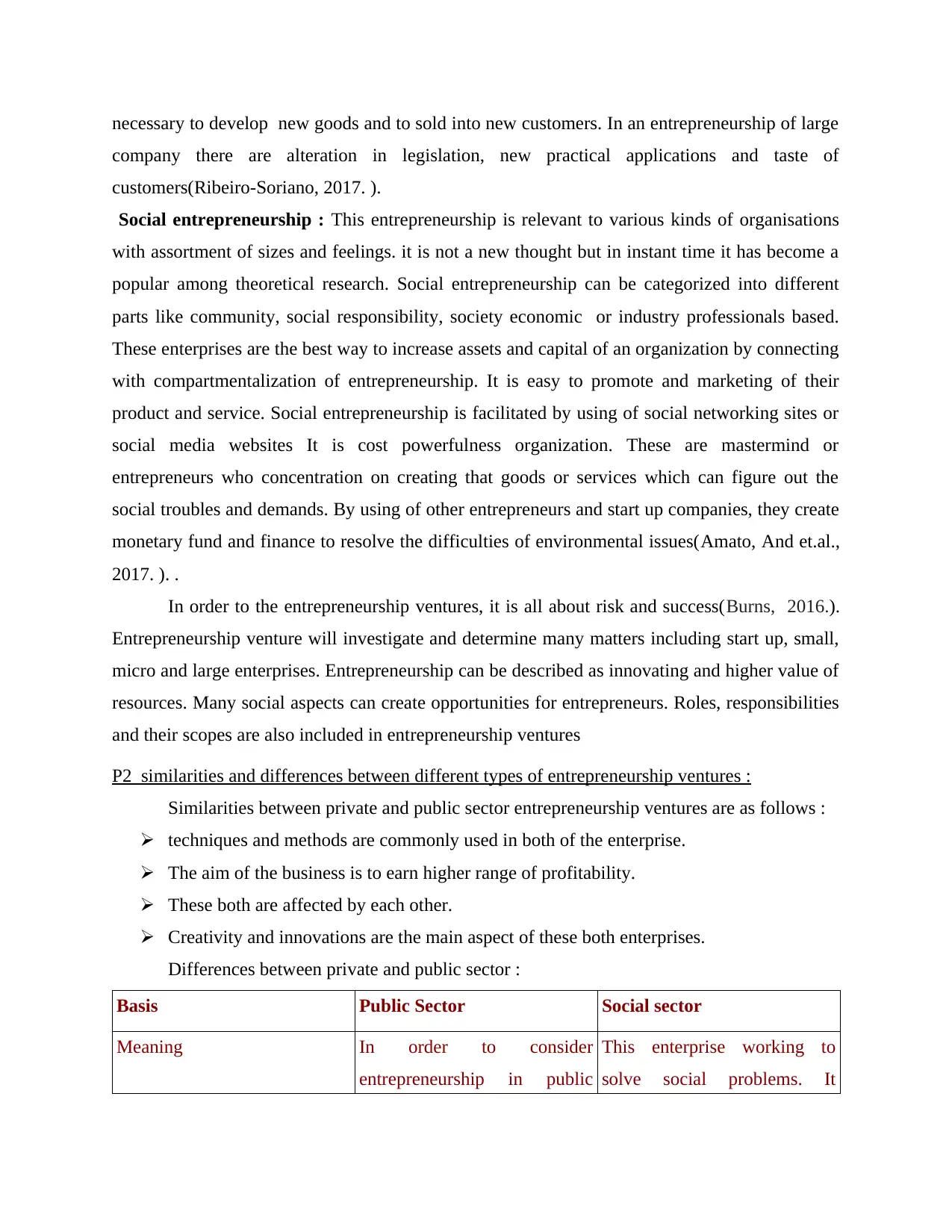
necessary to develop new goods and to sold into new customers. In an entrepreneurship of large
company there are alteration in legislation, new practical applications and taste of
customers(Ribeiro-Soriano, 2017. ).
Social entrepreneurship : This entrepreneurship is relevant to various kinds of organisations
with assortment of sizes and feelings. it is not a new thought but in instant time it has become a
popular among theoretical research. Social entrepreneurship can be categorized into different
parts like community, social responsibility, society economic or industry professionals based.
These enterprises are the best way to increase assets and capital of an organization by connecting
with compartmentalization of entrepreneurship. It is easy to promote and marketing of their
product and service. Social entrepreneurship is facilitated by using of social networking sites or
social media websites It is cost powerfulness organization. These are mastermind or
entrepreneurs who concentration on creating that goods or services which can figure out the
social troubles and demands. By using of other entrepreneurs and start up companies, they create
monetary fund and finance to resolve the difficulties of environmental issues(Amato, And et.al.,
2017. ). .
In order to the entrepreneurship ventures, it is all about risk and success(Burns, 2016.).
Entrepreneurship venture will investigate and determine many matters including start up, small,
micro and large enterprises. Entrepreneurship can be described as innovating and higher value of
resources. Many social aspects can create opportunities for entrepreneurs. Roles, responsibilities
and their scopes are also included in entrepreneurship ventures
P2 similarities and differences between different types of entrepreneurship ventures :
Similarities between private and public sector entrepreneurship ventures are as follows :
techniques and methods are commonly used in both of the enterprise.
The aim of the business is to earn higher range of profitability.
These both are affected by each other.
Creativity and innovations are the main aspect of these both enterprises.
Differences between private and public sector :
Basis Public Sector Social sector
Meaning In order to consider
entrepreneurship in public
This enterprise working to
solve social problems. It
company there are alteration in legislation, new practical applications and taste of
customers(Ribeiro-Soriano, 2017. ).
Social entrepreneurship : This entrepreneurship is relevant to various kinds of organisations
with assortment of sizes and feelings. it is not a new thought but in instant time it has become a
popular among theoretical research. Social entrepreneurship can be categorized into different
parts like community, social responsibility, society economic or industry professionals based.
These enterprises are the best way to increase assets and capital of an organization by connecting
with compartmentalization of entrepreneurship. It is easy to promote and marketing of their
product and service. Social entrepreneurship is facilitated by using of social networking sites or
social media websites It is cost powerfulness organization. These are mastermind or
entrepreneurs who concentration on creating that goods or services which can figure out the
social troubles and demands. By using of other entrepreneurs and start up companies, they create
monetary fund and finance to resolve the difficulties of environmental issues(Amato, And et.al.,
2017. ). .
In order to the entrepreneurship ventures, it is all about risk and success(Burns, 2016.).
Entrepreneurship venture will investigate and determine many matters including start up, small,
micro and large enterprises. Entrepreneurship can be described as innovating and higher value of
resources. Many social aspects can create opportunities for entrepreneurs. Roles, responsibilities
and their scopes are also included in entrepreneurship ventures
P2 similarities and differences between different types of entrepreneurship ventures :
Similarities between private and public sector entrepreneurship ventures are as follows :
techniques and methods are commonly used in both of the enterprise.
The aim of the business is to earn higher range of profitability.
These both are affected by each other.
Creativity and innovations are the main aspect of these both enterprises.
Differences between private and public sector :
Basis Public Sector Social sector
Meaning In order to consider
entrepreneurship in public
This enterprise working to
solve social problems. It
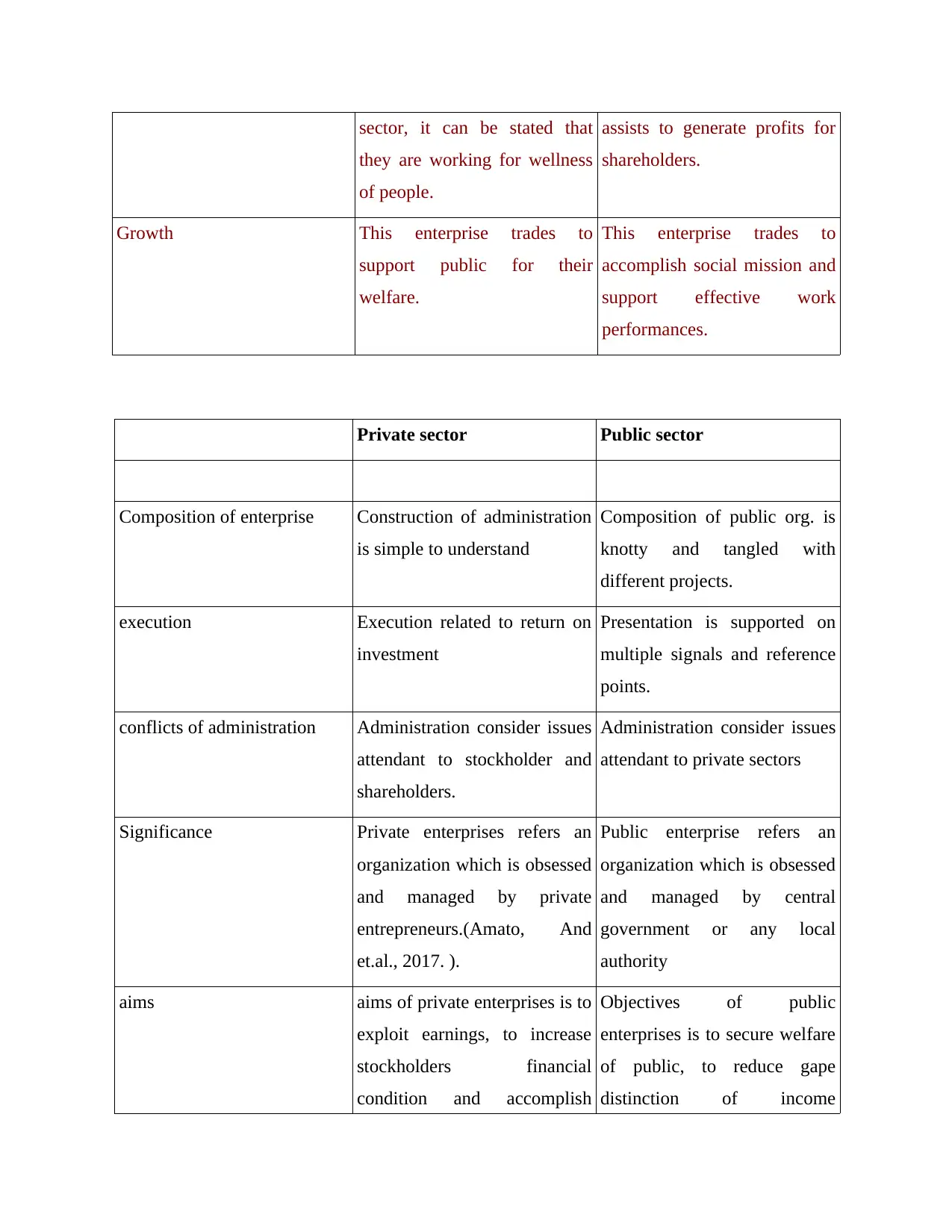
sector, it can be stated that
they are working for wellness
of people.
assists to generate profits for
shareholders.
Growth This enterprise trades to
support public for their
welfare.
This enterprise trades to
accomplish social mission and
support effective work
performances.
Private sector Public sector
Composition of enterprise Construction of administration
is simple to understand
Composition of public org. is
knotty and tangled with
different projects.
execution Execution related to return on
investment
Presentation is supported on
multiple signals and reference
points.
conflicts of administration Administration consider issues
attendant to stockholder and
shareholders.
Administration consider issues
attendant to private sectors
Significance Private enterprises refers an
organization which is obsessed
and managed by private
entrepreneurs.(Amato, And
et.al., 2017. ).
Public enterprise refers an
organization which is obsessed
and managed by central
government or any local
authority
aims aims of private enterprises is to
exploit earnings, to increase
stockholders financial
condition and accomplish
Objectives of public
enterprises is to secure welfare
of public, to reduce gape
distinction of income
they are working for wellness
of people.
assists to generate profits for
shareholders.
Growth This enterprise trades to
support public for their
welfare.
This enterprise trades to
accomplish social mission and
support effective work
performances.
Private sector Public sector
Composition of enterprise Construction of administration
is simple to understand
Composition of public org. is
knotty and tangled with
different projects.
execution Execution related to return on
investment
Presentation is supported on
multiple signals and reference
points.
conflicts of administration Administration consider issues
attendant to stockholder and
shareholders.
Administration consider issues
attendant to private sectors
Significance Private enterprises refers an
organization which is obsessed
and managed by private
entrepreneurs.(Amato, And
et.al., 2017. ).
Public enterprise refers an
organization which is obsessed
and managed by central
government or any local
authority
aims aims of private enterprises is to
exploit earnings, to increase
stockholders financial
condition and accomplish
Objectives of public
enterprises is to secure welfare
of public, to reduce gape
distinction of income
⊘ This is a preview!⊘
Do you want full access?
Subscribe today to unlock all pages.

Trusted by 1+ million students worldwide

needs of the customers. distribution.
forms Forms of these enterprises can
be sole proprietor, franchise
and limited companies.
Forms of these enterprises can
be divided into three parts like
public corporation,
governmental company and
departmental undertakings.
forms Forms of these enterprises can
be sole proprietor, franchise
and limited companies.
Forms of these enterprises can
be divided into three parts like
public corporation,
governmental company and
departmental undertakings.
Paraphrase This Document
Need a fresh take? Get an instant paraphrase of this document with our AI Paraphraser
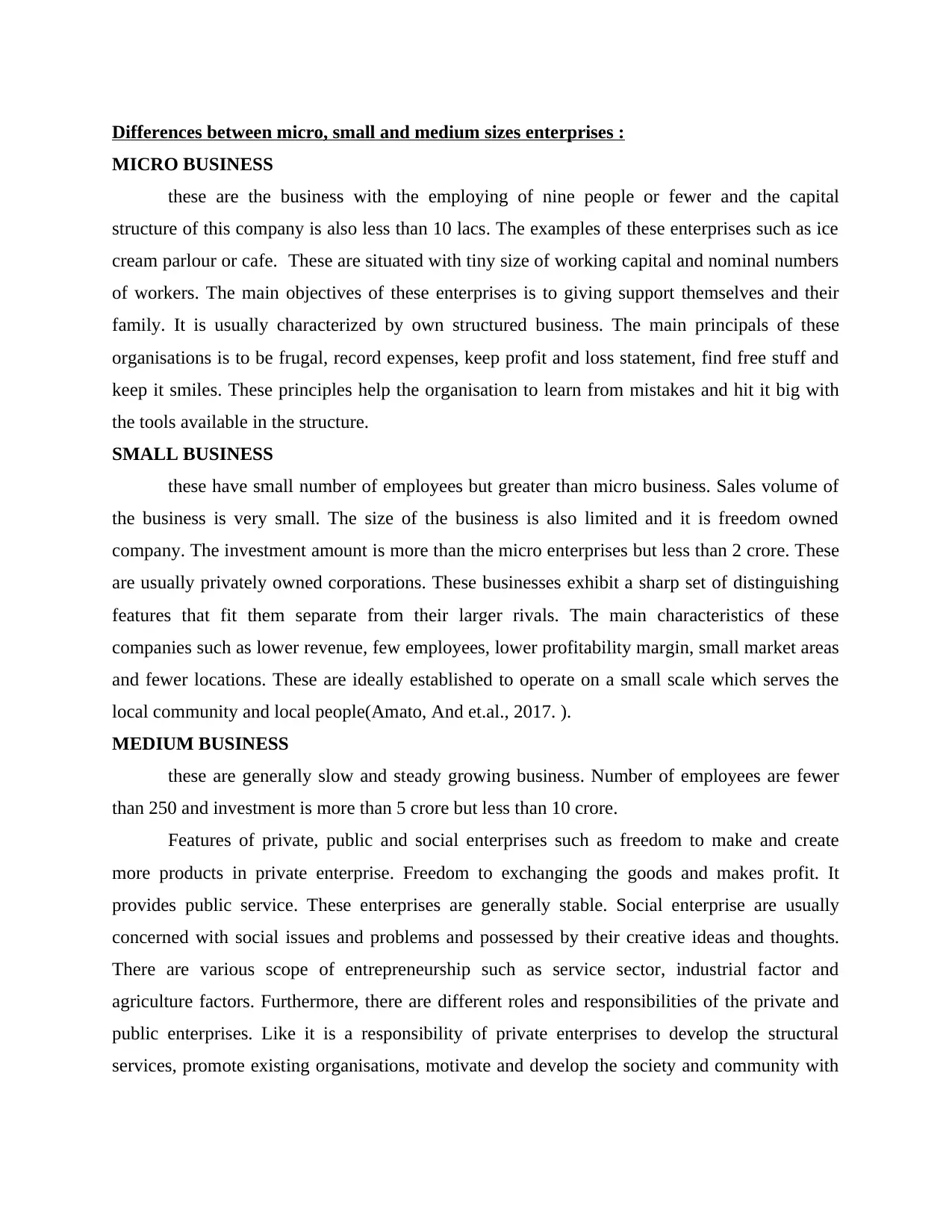
Differences between micro, small and medium sizes enterprises :
MICRO BUSINESS
these are the business with the employing of nine people or fewer and the capital
structure of this company is also less than 10 lacs. The examples of these enterprises such as ice
cream parlour or cafe. These are situated with tiny size of working capital and nominal numbers
of workers. The main objectives of these enterprises is to giving support themselves and their
family. It is usually characterized by own structured business. The main principals of these
organisations is to be frugal, record expenses, keep profit and loss statement, find free stuff and
keep it smiles. These principles help the organisation to learn from mistakes and hit it big with
the tools available in the structure.
SMALL BUSINESS
these have small number of employees but greater than micro business. Sales volume of
the business is very small. The size of the business is also limited and it is freedom owned
company. The investment amount is more than the micro enterprises but less than 2 crore. These
are usually privately owned corporations. These businesses exhibit a sharp set of distinguishing
features that fit them separate from their larger rivals. The main characteristics of these
companies such as lower revenue, few employees, lower profitability margin, small market areas
and fewer locations. These are ideally established to operate on a small scale which serves the
local community and local people(Amato, And et.al., 2017. ).
MEDIUM BUSINESS
these are generally slow and steady growing business. Number of employees are fewer
than 250 and investment is more than 5 crore but less than 10 crore.
Features of private, public and social enterprises such as freedom to make and create
more products in private enterprise. Freedom to exchanging the goods and makes profit. It
provides public service. These enterprises are generally stable. Social enterprise are usually
concerned with social issues and problems and possessed by their creative ideas and thoughts.
There are various scope of entrepreneurship such as service sector, industrial factor and
agriculture factors. Furthermore, there are different roles and responsibilities of the private and
public enterprises. Like it is a responsibility of private enterprises to develop the structural
services, promote existing organisations, motivate and develop the society and community with
MICRO BUSINESS
these are the business with the employing of nine people or fewer and the capital
structure of this company is also less than 10 lacs. The examples of these enterprises such as ice
cream parlour or cafe. These are situated with tiny size of working capital and nominal numbers
of workers. The main objectives of these enterprises is to giving support themselves and their
family. It is usually characterized by own structured business. The main principals of these
organisations is to be frugal, record expenses, keep profit and loss statement, find free stuff and
keep it smiles. These principles help the organisation to learn from mistakes and hit it big with
the tools available in the structure.
SMALL BUSINESS
these have small number of employees but greater than micro business. Sales volume of
the business is very small. The size of the business is also limited and it is freedom owned
company. The investment amount is more than the micro enterprises but less than 2 crore. These
are usually privately owned corporations. These businesses exhibit a sharp set of distinguishing
features that fit them separate from their larger rivals. The main characteristics of these
companies such as lower revenue, few employees, lower profitability margin, small market areas
and fewer locations. These are ideally established to operate on a small scale which serves the
local community and local people(Amato, And et.al., 2017. ).
MEDIUM BUSINESS
these are generally slow and steady growing business. Number of employees are fewer
than 250 and investment is more than 5 crore but less than 10 crore.
Features of private, public and social enterprises such as freedom to make and create
more products in private enterprise. Freedom to exchanging the goods and makes profit. It
provides public service. These enterprises are generally stable. Social enterprise are usually
concerned with social issues and problems and possessed by their creative ideas and thoughts.
There are various scope of entrepreneurship such as service sector, industrial factor and
agriculture factors. Furthermore, there are different roles and responsibilities of the private and
public enterprises. Like it is a responsibility of private enterprises to develop the structural
services, promote existing organisations, motivate and develop the society and community with
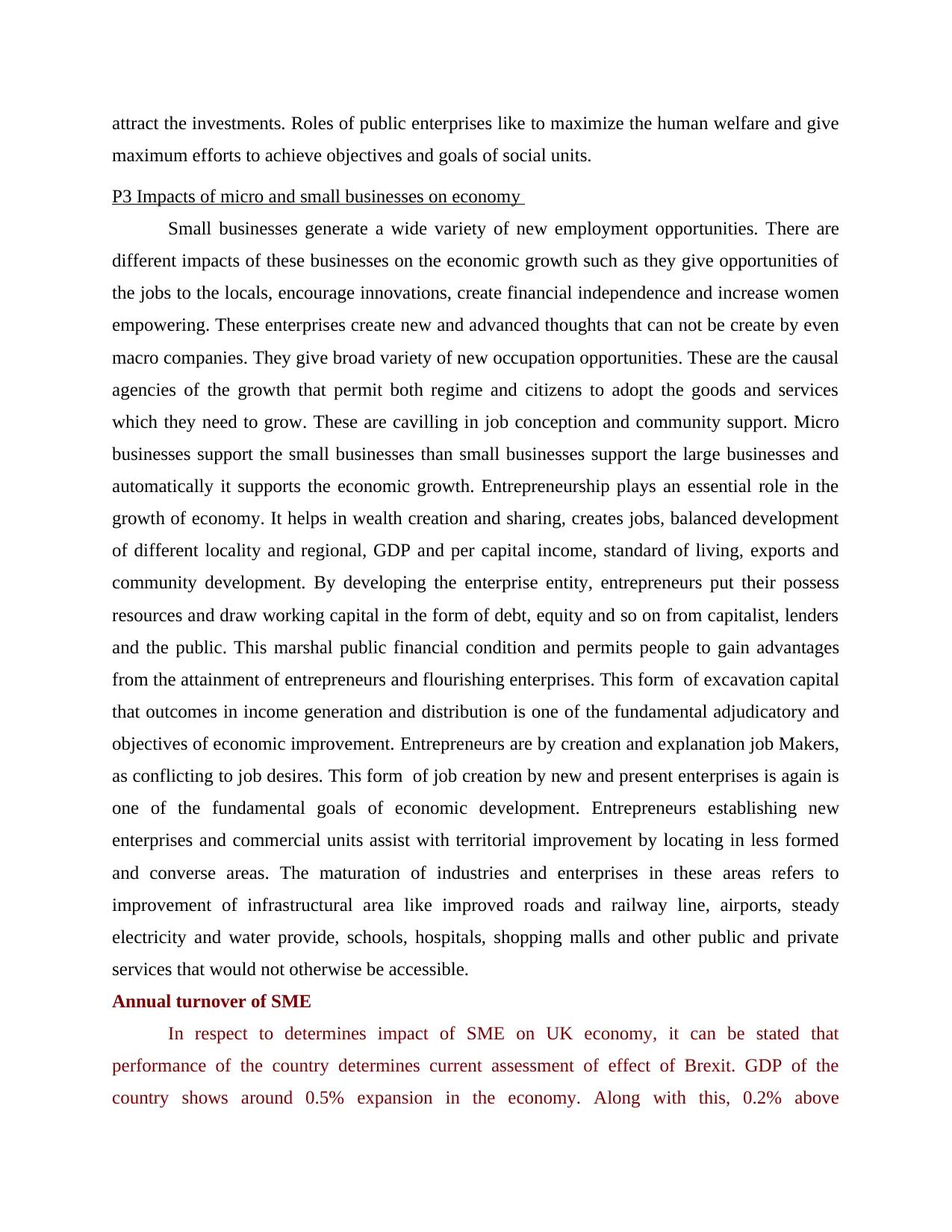
attract the investments. Roles of public enterprises like to maximize the human welfare and give
maximum efforts to achieve objectives and goals of social units.
P3 Impacts of micro and small businesses on economy
Small businesses generate a wide variety of new employment opportunities. There are
different impacts of these businesses on the economic growth such as they give opportunities of
the jobs to the locals, encourage innovations, create financial independence and increase women
empowering. These enterprises create new and advanced thoughts that can not be create by even
macro companies. They give broad variety of new occupation opportunities. These are the causal
agencies of the growth that permit both regime and citizens to adopt the goods and services
which they need to grow. These are cavilling in job conception and community support. Micro
businesses support the small businesses than small businesses support the large businesses and
automatically it supports the economic growth. Entrepreneurship plays an essential role in the
growth of economy. It helps in wealth creation and sharing, creates jobs, balanced development
of different locality and regional, GDP and per capital income, standard of living, exports and
community development. By developing the enterprise entity, entrepreneurs put their possess
resources and draw working capital in the form of debt, equity and so on from capitalist, lenders
and the public. This marshal public financial condition and permits people to gain advantages
from the attainment of entrepreneurs and flourishing enterprises. This form of excavation capital
that outcomes in income generation and distribution is one of the fundamental adjudicatory and
objectives of economic improvement. Entrepreneurs are by creation and explanation job Makers,
as conflicting to job desires. This form of job creation by new and present enterprises is again is
one of the fundamental goals of economic development. Entrepreneurs establishing new
enterprises and commercial units assist with territorial improvement by locating in less formed
and converse areas. The maturation of industries and enterprises in these areas refers to
improvement of infrastructural area like improved roads and railway line, airports, steady
electricity and water provide, schools, hospitals, shopping malls and other public and private
services that would not otherwise be accessible.
Annual turnover of SME
In respect to determines impact of SME on UK economy, it can be stated that
performance of the country determines current assessment of effect of Brexit. GDP of the
country shows around 0.5% expansion in the economy. Along with this, 0.2% above
maximum efforts to achieve objectives and goals of social units.
P3 Impacts of micro and small businesses on economy
Small businesses generate a wide variety of new employment opportunities. There are
different impacts of these businesses on the economic growth such as they give opportunities of
the jobs to the locals, encourage innovations, create financial independence and increase women
empowering. These enterprises create new and advanced thoughts that can not be create by even
macro companies. They give broad variety of new occupation opportunities. These are the causal
agencies of the growth that permit both regime and citizens to adopt the goods and services
which they need to grow. These are cavilling in job conception and community support. Micro
businesses support the small businesses than small businesses support the large businesses and
automatically it supports the economic growth. Entrepreneurship plays an essential role in the
growth of economy. It helps in wealth creation and sharing, creates jobs, balanced development
of different locality and regional, GDP and per capital income, standard of living, exports and
community development. By developing the enterprise entity, entrepreneurs put their possess
resources and draw working capital in the form of debt, equity and so on from capitalist, lenders
and the public. This marshal public financial condition and permits people to gain advantages
from the attainment of entrepreneurs and flourishing enterprises. This form of excavation capital
that outcomes in income generation and distribution is one of the fundamental adjudicatory and
objectives of economic improvement. Entrepreneurs are by creation and explanation job Makers,
as conflicting to job desires. This form of job creation by new and present enterprises is again is
one of the fundamental goals of economic development. Entrepreneurs establishing new
enterprises and commercial units assist with territorial improvement by locating in less formed
and converse areas. The maturation of industries and enterprises in these areas refers to
improvement of infrastructural area like improved roads and railway line, airports, steady
electricity and water provide, schools, hospitals, shopping malls and other public and private
services that would not otherwise be accessible.
Annual turnover of SME
In respect to determines impact of SME on UK economy, it can be stated that
performance of the country determines current assessment of effect of Brexit. GDP of the
country shows around 0.5% expansion in the economy. Along with this, 0.2% above
⊘ This is a preview!⊘
Do you want full access?
Subscribe today to unlock all pages.

Trusted by 1+ million students worldwide
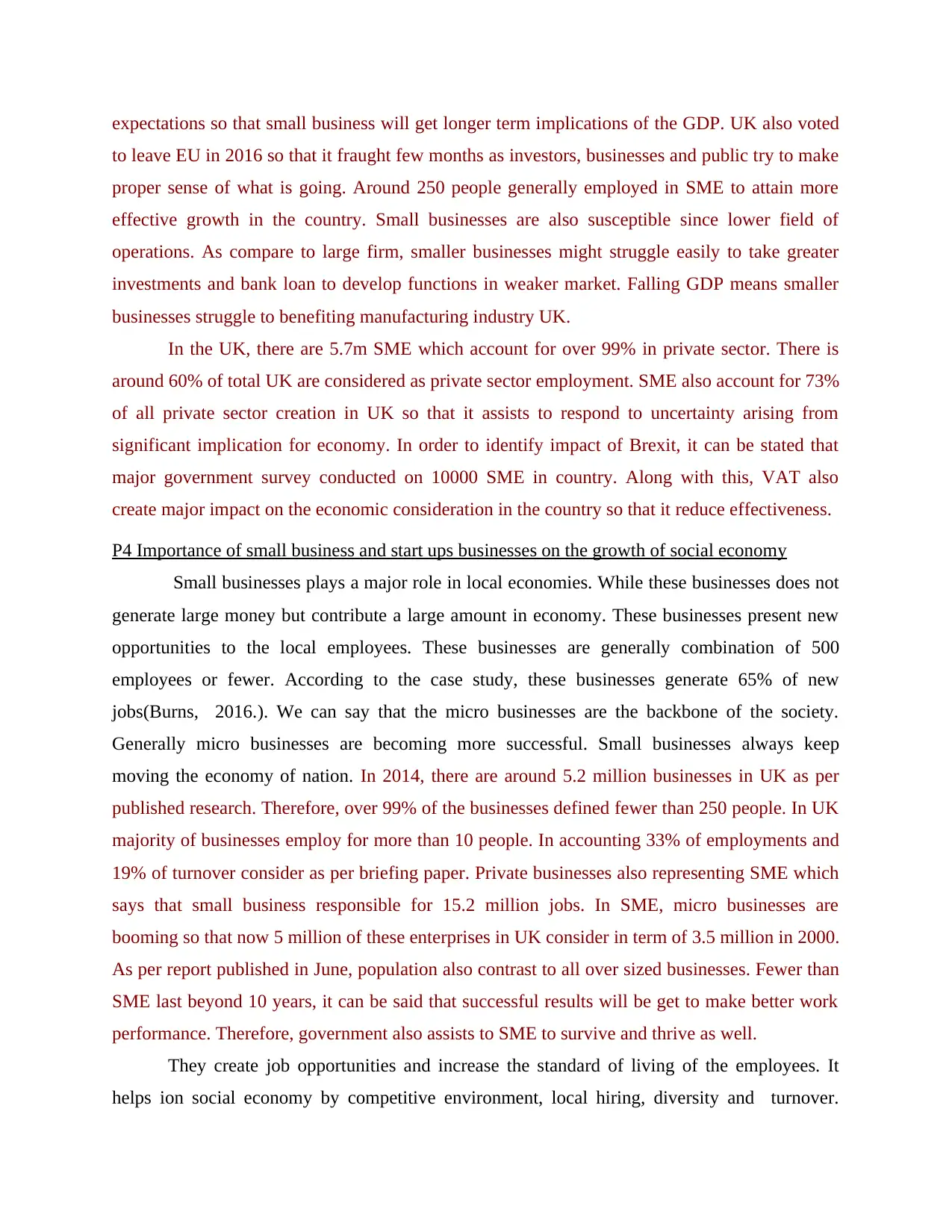
expectations so that small business will get longer term implications of the GDP. UK also voted
to leave EU in 2016 so that it fraught few months as investors, businesses and public try to make
proper sense of what is going. Around 250 people generally employed in SME to attain more
effective growth in the country. Small businesses are also susceptible since lower field of
operations. As compare to large firm, smaller businesses might struggle easily to take greater
investments and bank loan to develop functions in weaker market. Falling GDP means smaller
businesses struggle to benefiting manufacturing industry UK.
In the UK, there are 5.7m SME which account for over 99% in private sector. There is
around 60% of total UK are considered as private sector employment. SME also account for 73%
of all private sector creation in UK so that it assists to respond to uncertainty arising from
significant implication for economy. In order to identify impact of Brexit, it can be stated that
major government survey conducted on 10000 SME in country. Along with this, VAT also
create major impact on the economic consideration in the country so that it reduce effectiveness.
P4 Importance of small business and start ups businesses on the growth of social economy
Small businesses plays a major role in local economies. While these businesses does not
generate large money but contribute a large amount in economy. These businesses present new
opportunities to the local employees. These businesses are generally combination of 500
employees or fewer. According to the case study, these businesses generate 65% of new
jobs(Burns, 2016.). We can say that the micro businesses are the backbone of the society.
Generally micro businesses are becoming more successful. Small businesses always keep
moving the economy of nation. In 2014, there are around 5.2 million businesses in UK as per
published research. Therefore, over 99% of the businesses defined fewer than 250 people. In UK
majority of businesses employ for more than 10 people. In accounting 33% of employments and
19% of turnover consider as per briefing paper. Private businesses also representing SME which
says that small business responsible for 15.2 million jobs. In SME, micro businesses are
booming so that now 5 million of these enterprises in UK consider in term of 3.5 million in 2000.
As per report published in June, population also contrast to all over sized businesses. Fewer than
SME last beyond 10 years, it can be said that successful results will be get to make better work
performance. Therefore, government also assists to SME to survive and thrive as well.
They create job opportunities and increase the standard of living of the employees. It
helps ion social economy by competitive environment, local hiring, diversity and turnover.
to leave EU in 2016 so that it fraught few months as investors, businesses and public try to make
proper sense of what is going. Around 250 people generally employed in SME to attain more
effective growth in the country. Small businesses are also susceptible since lower field of
operations. As compare to large firm, smaller businesses might struggle easily to take greater
investments and bank loan to develop functions in weaker market. Falling GDP means smaller
businesses struggle to benefiting manufacturing industry UK.
In the UK, there are 5.7m SME which account for over 99% in private sector. There is
around 60% of total UK are considered as private sector employment. SME also account for 73%
of all private sector creation in UK so that it assists to respond to uncertainty arising from
significant implication for economy. In order to identify impact of Brexit, it can be stated that
major government survey conducted on 10000 SME in country. Along with this, VAT also
create major impact on the economic consideration in the country so that it reduce effectiveness.
P4 Importance of small business and start ups businesses on the growth of social economy
Small businesses plays a major role in local economies. While these businesses does not
generate large money but contribute a large amount in economy. These businesses present new
opportunities to the local employees. These businesses are generally combination of 500
employees or fewer. According to the case study, these businesses generate 65% of new
jobs(Burns, 2016.). We can say that the micro businesses are the backbone of the society.
Generally micro businesses are becoming more successful. Small businesses always keep
moving the economy of nation. In 2014, there are around 5.2 million businesses in UK as per
published research. Therefore, over 99% of the businesses defined fewer than 250 people. In UK
majority of businesses employ for more than 10 people. In accounting 33% of employments and
19% of turnover consider as per briefing paper. Private businesses also representing SME which
says that small business responsible for 15.2 million jobs. In SME, micro businesses are
booming so that now 5 million of these enterprises in UK consider in term of 3.5 million in 2000.
As per report published in June, population also contrast to all over sized businesses. Fewer than
SME last beyond 10 years, it can be said that successful results will be get to make better work
performance. Therefore, government also assists to SME to survive and thrive as well.
They create job opportunities and increase the standard of living of the employees. It
helps ion social economy by competitive environment, local hiring, diversity and turnover.
Paraphrase This Document
Need a fresh take? Get an instant paraphrase of this document with our AI Paraphraser
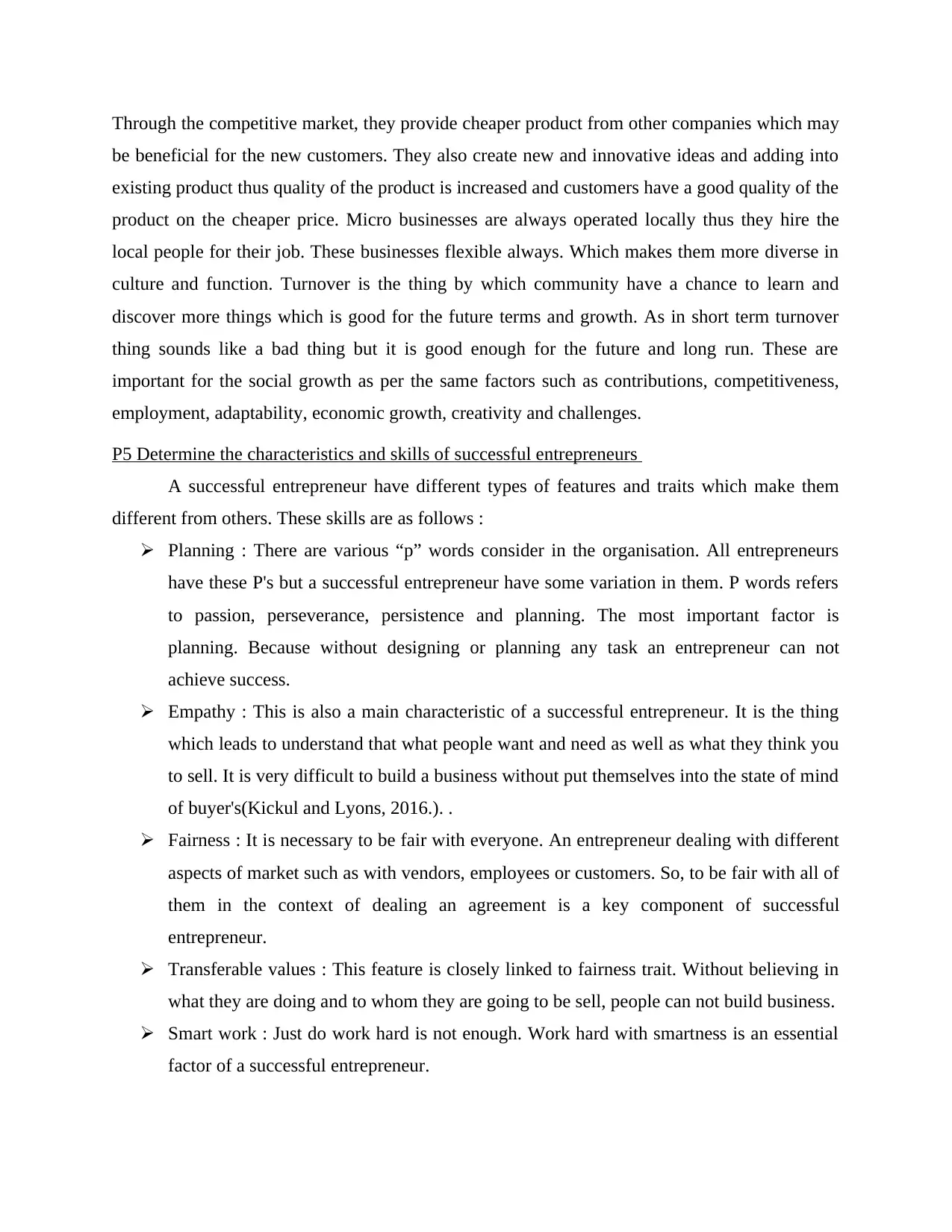
Through the competitive market, they provide cheaper product from other companies which may
be beneficial for the new customers. They also create new and innovative ideas and adding into
existing product thus quality of the product is increased and customers have a good quality of the
product on the cheaper price. Micro businesses are always operated locally thus they hire the
local people for their job. These businesses flexible always. Which makes them more diverse in
culture and function. Turnover is the thing by which community have a chance to learn and
discover more things which is good for the future terms and growth. As in short term turnover
thing sounds like a bad thing but it is good enough for the future and long run. These are
important for the social growth as per the same factors such as contributions, competitiveness,
employment, adaptability, economic growth, creativity and challenges.
P5 Determine the characteristics and skills of successful entrepreneurs
A successful entrepreneur have different types of features and traits which make them
different from others. These skills are as follows :
Planning : There are various “p” words consider in the organisation. All entrepreneurs
have these P's but a successful entrepreneur have some variation in them. P words refers
to passion, perseverance, persistence and planning. The most important factor is
planning. Because without designing or planning any task an entrepreneur can not
achieve success.
Empathy : This is also a main characteristic of a successful entrepreneur. It is the thing
which leads to understand that what people want and need as well as what they think you
to sell. It is very difficult to build a business without put themselves into the state of mind
of buyer's(Kickul and Lyons, 2016.). .
Fairness : It is necessary to be fair with everyone. An entrepreneur dealing with different
aspects of market such as with vendors, employees or customers. So, to be fair with all of
them in the context of dealing an agreement is a key component of successful
entrepreneur.
Transferable values : This feature is closely linked to fairness trait. Without believing in
what they are doing and to whom they are going to be sell, people can not build business.
Smart work : Just do work hard is not enough. Work hard with smartness is an essential
factor of a successful entrepreneur.
be beneficial for the new customers. They also create new and innovative ideas and adding into
existing product thus quality of the product is increased and customers have a good quality of the
product on the cheaper price. Micro businesses are always operated locally thus they hire the
local people for their job. These businesses flexible always. Which makes them more diverse in
culture and function. Turnover is the thing by which community have a chance to learn and
discover more things which is good for the future terms and growth. As in short term turnover
thing sounds like a bad thing but it is good enough for the future and long run. These are
important for the social growth as per the same factors such as contributions, competitiveness,
employment, adaptability, economic growth, creativity and challenges.
P5 Determine the characteristics and skills of successful entrepreneurs
A successful entrepreneur have different types of features and traits which make them
different from others. These skills are as follows :
Planning : There are various “p” words consider in the organisation. All entrepreneurs
have these P's but a successful entrepreneur have some variation in them. P words refers
to passion, perseverance, persistence and planning. The most important factor is
planning. Because without designing or planning any task an entrepreneur can not
achieve success.
Empathy : This is also a main characteristic of a successful entrepreneur. It is the thing
which leads to understand that what people want and need as well as what they think you
to sell. It is very difficult to build a business without put themselves into the state of mind
of buyer's(Kickul and Lyons, 2016.). .
Fairness : It is necessary to be fair with everyone. An entrepreneur dealing with different
aspects of market such as with vendors, employees or customers. So, to be fair with all of
them in the context of dealing an agreement is a key component of successful
entrepreneur.
Transferable values : This feature is closely linked to fairness trait. Without believing in
what they are doing and to whom they are going to be sell, people can not build business.
Smart work : Just do work hard is not enough. Work hard with smartness is an essential
factor of a successful entrepreneur.
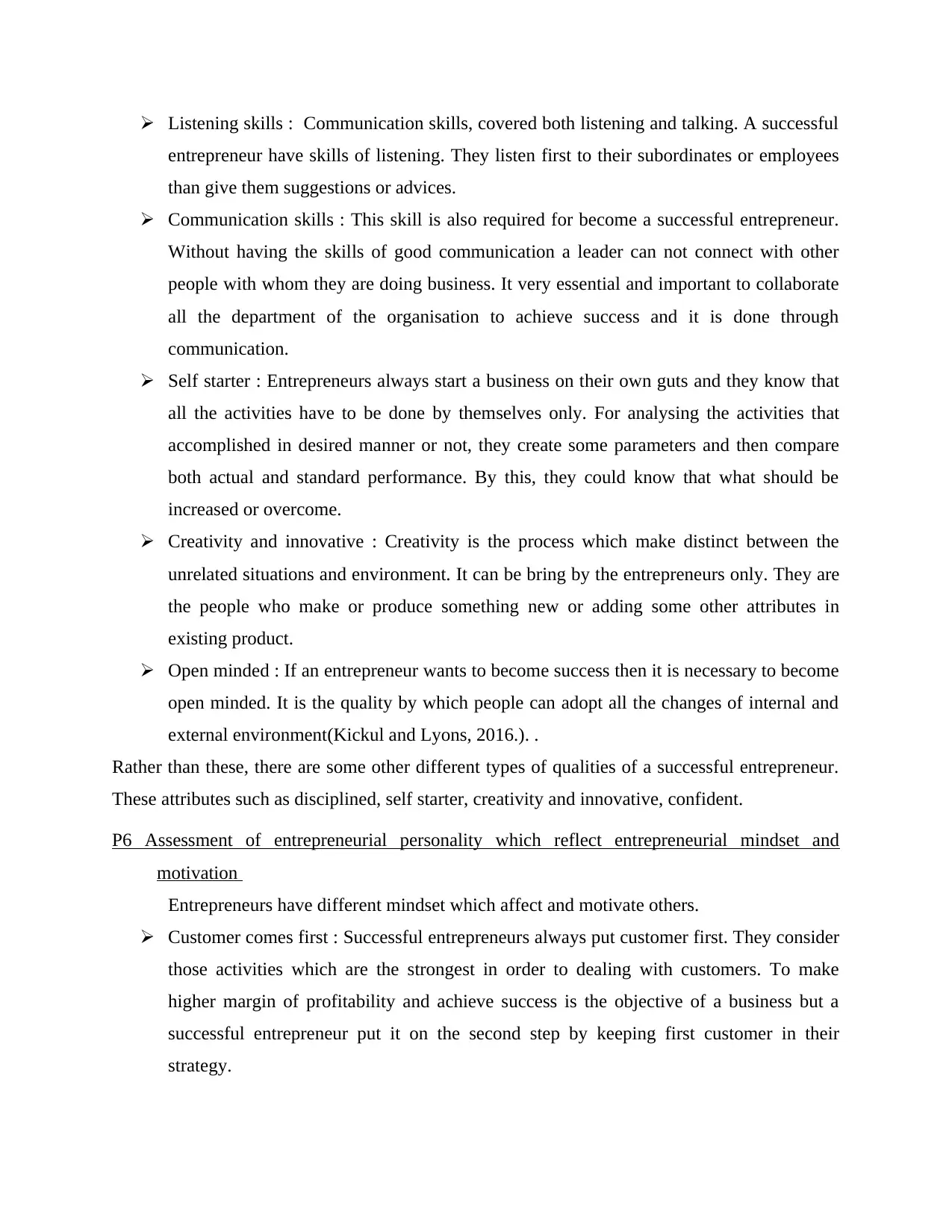
Listening skills : Communication skills, covered both listening and talking. A successful
entrepreneur have skills of listening. They listen first to their subordinates or employees
than give them suggestions or advices.
Communication skills : This skill is also required for become a successful entrepreneur.
Without having the skills of good communication a leader can not connect with other
people with whom they are doing business. It very essential and important to collaborate
all the department of the organisation to achieve success and it is done through
communication.
Self starter : Entrepreneurs always start a business on their own guts and they know that
all the activities have to be done by themselves only. For analysing the activities that
accomplished in desired manner or not, they create some parameters and then compare
both actual and standard performance. By this, they could know that what should be
increased or overcome.
Creativity and innovative : Creativity is the process which make distinct between the
unrelated situations and environment. It can be bring by the entrepreneurs only. They are
the people who make or produce something new or adding some other attributes in
existing product.
Open minded : If an entrepreneur wants to become success then it is necessary to become
open minded. It is the quality by which people can adopt all the changes of internal and
external environment(Kickul and Lyons, 2016.). .
Rather than these, there are some other different types of qualities of a successful entrepreneur.
These attributes such as disciplined, self starter, creativity and innovative, confident.
P6 Assessment of entrepreneurial personality which reflect entrepreneurial mindset and
motivation
Entrepreneurs have different mindset which affect and motivate others.
Customer comes first : Successful entrepreneurs always put customer first. They consider
those activities which are the strongest in order to dealing with customers. To make
higher margin of profitability and achieve success is the objective of a business but a
successful entrepreneur put it on the second step by keeping first customer in their
strategy.
entrepreneur have skills of listening. They listen first to their subordinates or employees
than give them suggestions or advices.
Communication skills : This skill is also required for become a successful entrepreneur.
Without having the skills of good communication a leader can not connect with other
people with whom they are doing business. It very essential and important to collaborate
all the department of the organisation to achieve success and it is done through
communication.
Self starter : Entrepreneurs always start a business on their own guts and they know that
all the activities have to be done by themselves only. For analysing the activities that
accomplished in desired manner or not, they create some parameters and then compare
both actual and standard performance. By this, they could know that what should be
increased or overcome.
Creativity and innovative : Creativity is the process which make distinct between the
unrelated situations and environment. It can be bring by the entrepreneurs only. They are
the people who make or produce something new or adding some other attributes in
existing product.
Open minded : If an entrepreneur wants to become success then it is necessary to become
open minded. It is the quality by which people can adopt all the changes of internal and
external environment(Kickul and Lyons, 2016.). .
Rather than these, there are some other different types of qualities of a successful entrepreneur.
These attributes such as disciplined, self starter, creativity and innovative, confident.
P6 Assessment of entrepreneurial personality which reflect entrepreneurial mindset and
motivation
Entrepreneurs have different mindset which affect and motivate others.
Customer comes first : Successful entrepreneurs always put customer first. They consider
those activities which are the strongest in order to dealing with customers. To make
higher margin of profitability and achieve success is the objective of a business but a
successful entrepreneur put it on the second step by keeping first customer in their
strategy.
⊘ This is a preview!⊘
Do you want full access?
Subscribe today to unlock all pages.

Trusted by 1+ million students worldwide
1 out of 18
Related Documents
Your All-in-One AI-Powered Toolkit for Academic Success.
+13062052269
info@desklib.com
Available 24*7 on WhatsApp / Email
![[object Object]](/_next/static/media/star-bottom.7253800d.svg)
Unlock your academic potential
Copyright © 2020–2026 A2Z Services. All Rights Reserved. Developed and managed by ZUCOL.





